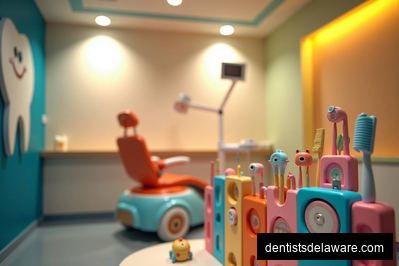Introduction
For many Delaware parents, understanding and managing their children's dental needs can seem like a daunting task. However, pediatric dental care is critical to ensuring the long-term health and wellness of your child. This guide will provide a comprehensive overview of pediatric dental needs, providing you with the knowledge and tools to make informed decisions about your child's oral health.
In this post, we will delve into the importance of pediatric dental care, common dental issues faced by children, preventive measures, and treatment options. We will also provide insights from renowned dental professionals and share experiences of Delaware parents who have navigated the pediatric dental care landscape.
As we delve deeper into the realm of pediatric dental care, it becomes evident that the introduction is merely the tip of the iceberg. Parents in Delaware are often faced with a multitude of decisions when it comes to their children's oral health, from choosing the right toothbrush to understanding the importance of routine dental check-ups. It's not just about preventing cavities; it's about instilling lifelong oral hygiene habits that will benefit their children well into adulthood.
Moreover, the introduction sets the stage for discussions on specialized treatments like braces, fluoride applications, and even the role of nutrition in dental health. By laying a strong foundation in this initial phase, parents can navigate the complex landscape of pediatric dentistry with confidence and knowledge. Ultimately, the introduction acts as a gateway to a world of dental care tailored specifically for the unique needs of children in Delaware.
Importance of Pediatric Dental Care
A child's dental health plays a significant role in their overall wellbeing. Dental issues can lead to pain, difficulty eating, and in severe cases, infections that may affect a child's growth and development. According to the Centers for Disease Control and Prevention, tooth decay is one of the most common chronic conditions of childhood in the United States. In Delaware, approximately 40% of children have had a cavity by the time they reach kindergarten, demonstrating a pressing need for early dental care.
Dr. Jennifer Ashton, a renowned pediatric dentist in Delaware, emphasizes the importance of early dental care. "Establishing a dental home for your child by their first birthday can help prevent dental problems," she says. "Early visits also familiarize the child with the dental office environment, reducing anxiety about future visits."
Furthermore, pediatric dental care lays the foundation for a lifetime of good oral health habits. By teaching your child about the importance of regular brushing, flossing, and dental check-ups, you are setting them on a path to maintain their oral health into adulthood.
Regular pediatric dental care is crucial not only for maintaining a child's oral health but also for preventing more serious complications in the future. Early dental check-ups can detect issues like tooth decay or misalignment, allowing for timely interventions to prevent further problems. Moreover, teaching children proper oral hygiene habits from a young age can set them up for a lifetime of healthy smiles. For instance, routine cleanings and fluoride treatments can help strengthen their teeth and protect against cavities. By emphasizing the importance of pediatric dental care, parents can instill good habits in their children that will benefit them well into adulthood.
Common Dental Issues in Children
Children can experience a range of dental issues. Some of the most common include tooth decay, gum disease, and malocclusion (improper alignment of teeth). Early tooth loss due to accidents or decay can also lead to space loss, affecting the alignment of permanent teeth.
Tooth decay, also known as dental caries or cavities, is caused by bacteria in the mouth that break down sugars from food and produce acids that damage the enamel. The American Dental Association reports that over 50% of children will be affected by tooth decay before they turn five.
Susan, a Delaware parent, shares her experience with her daughter's early tooth decay. "My four-year-old was diagnosed with a cavity after complaining about a toothache. I was shocked because we always brushed her teeth. The dentist explained that her frequent snacking habits and juice consumption were contributing factors. We've since made changes to her diet and oral care routine."
When it comes to common dental issues in children, one often overlooked concern is the impact of thumb sucking and pacifier use. These habits can lead to misaligned teeth and improper jaw development, requiring orthodontic intervention later on. Additionally, parents should be vigilant about monitoring their child's sugar intake as it is a major contributor to tooth decay. Limiting sugary snacks and drinks can significantly reduce the risk of cavities and other dental problems. Regular dental check-ups are crucial in detecting issues early on and preventing more serious complications down the line. By staying proactive and educating both parents and children on these common dental issues, we can promote better oral health habits and ensure brighter smiles for the future.
Preventing Dental Issues
Preventing dental issues in children involves a combination of good oral hygiene practices, dietary management, and regular dental check-ups. Brushing twice a day with fluoride toothpaste, flossing regularly, and limiting sugary snacks and drinks can significantly reduce the risk of tooth decay.
The Delaware Department of Health recommends a dental check-up every six months for children. Regular check-ups allow for early detection of dental issues, enabling prompt treatment and preventing further complications.
Dr. Thomas, a pediatric dentist in Delaware, underscores the importance of preventive measures. "By taking preventive steps, parents can help their children avoid dental issues that may require more complex treatment later on. Also, preventive measures are cost-effective in the long run."
Aside from regular brushing and flossing, another crucial aspect of preventing dental issues in children is monitoring their sugar intake. Sugary snacks and drinks can contribute to tooth decay and cavities, so encouraging healthier snack options like fruits and vegetables can make a significant impact on their oral health. Additionally, scheduling routine dental check-ups for children is essential in catching any potential issues early on. These visits not only help in maintaining oral hygiene but also serve as educational opportunities for both children and parents on proper dental care practices. By combining these efforts with a positive and consistent oral hygiene routine, parents can set their children up for a lifetime of healthy smiles.
Treatment Options
Treatment options for pediatric dental issues vary depending on the nature and severity of the problem. For tooth decay, the dentist may recommend fillings or crowns. Severe cases may require root canal treatment or tooth extraction. Malocclusion can be corrected through orthodontic treatment, which may involve braces or aligners.
Beyond these, there are also several advancements in pediatric dentistry, including the use of silver diamine fluoride for arresting tooth decay, laser dentistry for painless procedures, and sedation dentistry for anxious children.
Real-life experiences can shed light on treatment options. Consider Delaware parent Mark's story. "My son needed a filling for a cavity. The dentist offered us the option of using silver diamine fluoride to stop the decay. It was a painless procedure, and we were pleased with the results."
When it comes to exploring treatment options for pediatric dental issues, it's crucial to consider the individual needs of each child. For instance, a common treatment option for cavities in young patients may involve dental fillings made of tooth-colored materials to maintain aesthetics and functionality. Alternatively, in cases of misaligned teeth, orthodontic treatments like braces or clear aligners could be recommended to correct the alignment and improve oral health.
Furthermore, preventive measures such as dental sealants and fluoride treatments can also be effective treatment options to protect children's teeth from decay and promote long-term dental health. By discussing these tailored treatment options with a pediatric dentist, parents can make informed decisions that align with their child's unique dental needs and ensure a healthy smile for years to come.
Conclusion
Understanding pediatric dental needs is crucial for every parent. By being proactive about your child's oral health, you can prevent many common dental issues and ensure the development of strong, healthy teeth. Remember, establishing good oral health habits early on paves the way for a lifetime of healthy smiles.
Regular dental check-ups, good dietary habits, and a robust oral hygiene routine are the cornerstone of pediatric dental health. If any dental issues arise, consult with a dental professional to understand the best treatment options for your child. Healthy teeth are an essential part of your child's overall health and well-being, so invest in their smiles today for a healthier tomorrow.
In conclusion, prioritizing your child's dental health sets the foundation for a lifetime of healthy smiles and habits. Beyond the routine check-ups and cleanings, instilling good oral hygiene practices early on can make a significant impact on their overall well-being. Encouraging your child to brush and floss regularly, as well as limiting sugary snacks and drinks, can help prevent cavities and other dental issues down the road.
Additionally, fostering a positive relationship with your child's dentist from a young age can alleviate any fears or anxieties they may have about dental visits. By creating a supportive environment where your child feels comfortable and safe, you are not only promoting good dental health but also empowering them to take ownership of their oral care. Remember, the journey to optimal dental health is a collaborative effort between parents, children, and dental professionals.









